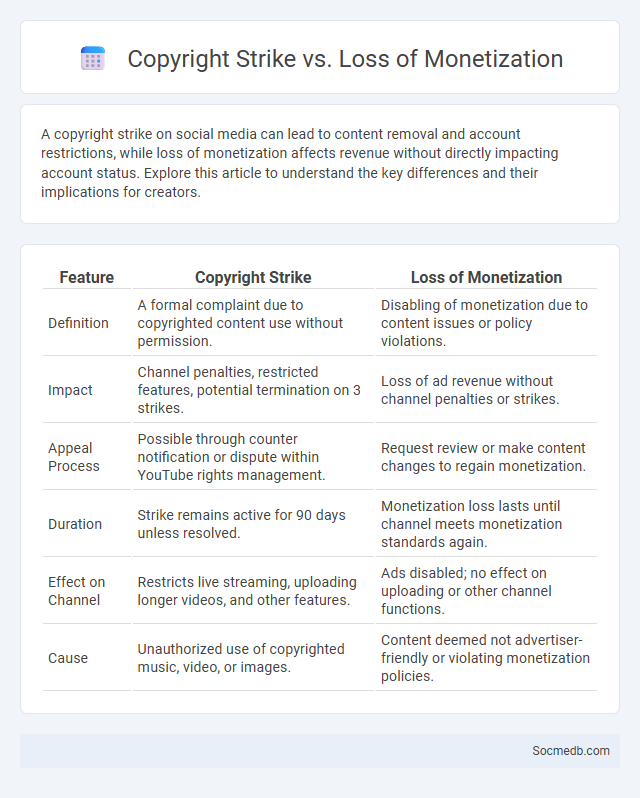
Photo illustration: Copyright Strike vs Loss of Monetization
A copyright strike on social media can lead to content removal and account restrictions, while loss of monetization affects revenue without directly impacting account status. Explore this article to understand the key differences and their implications for creators.
Table of Comparison
| Feature | Copyright Strike | Loss of Monetization |
|---|---|---|
| Definition | A formal complaint due to copyrighted content use without permission. | Disabling of monetization due to content issues or policy violations. |
| Impact | Channel penalties, restricted features, potential termination on 3 strikes. | Loss of ad revenue without channel penalties or strikes. |
| Appeal Process | Possible through counter notification or dispute within YouTube rights management. | Request review or make content changes to regain monetization. |
| Duration | Strike remains active for 90 days unless resolved. | Monetization loss lasts until channel meets monetization standards again. |
| Effect on Channel | Restricts live streaming, uploading longer videos, and other features. | Ads disabled; no effect on uploading or other channel functions. |
| Cause | Unauthorized use of copyrighted music, video, or images. | Content deemed not advertiser-friendly or violating monetization policies. |
Understanding Copyright Strike: Definition and Implications
A copyright strike on social media occurs when content is removed or restricted due to a claim that it violates copyright law, impacting creators' accounts and content visibility. Platforms like YouTube, Facebook, and Instagram enforce these strikes to protect intellectual property rights and may impose penalties such as video removal, account suspension, or demonetization. Understanding the implications of a copyright strike helps users avoid repeated violations that could lead to permanent account termination.
Loss of Monetization Explained: What Does It Mean?
Loss of monetization on social media occurs when platforms disable a user's ability to earn revenue from content, often due to violations of community guidelines or copyright issues. This means creators lose access to ad revenue, sponsorship deals, and other income streams tied to their accounts. Understanding platform-specific policies on monetization is crucial for maintaining consistent earnings and avoiding penalties.
Key Differences Between Copyright Strike and Loss of Monetization
A copyright strike results from unauthorized use of protected content, potentially leading to video removal and account penalties, whereas loss of monetization occurs when content violates platform monetization policies but remains viewable. Copyright strikes impact channel standing directly and can lead to termination after multiple strikes, while loss of monetization affects revenue generation without immediate risk to channel existence. Understanding these distinctions is crucial for creators to maintain compliance and protect their income streams on platforms like YouTube.
Common Causes of Copyright Strikes on Digital Platforms
You may face copyright strikes on social media for uploading protected content such as music, videos, or images without proper permission or licensing. Using copyrighted material in live streams, reproducing substantial parts of someone else's work, or sharing content that infringes on intellectual property rights commonly triggers these strikes. Understanding platform-specific copyright policies and securing necessary rights helps prevent your content from being removed or your account from suspension.
How Loss of Monetization Affects Content Creators
Loss of monetization critically impacts content creators by drastically reducing their income streams, threatening their financial stability and ability to invest in quality content production. This decrease in revenue compromises creators' capacity to maintain consistent output and engage audiences, ultimately diminishing their visibility and growth potential on platforms like YouTube and Instagram. Reduced monetization also limits access to resources for marketing and collaboration, undermining long-term career sustainability in the digital economy.
Legal Consequences: Copyright Strike vs Loss of Monetization
Copyright strikes on social media platforms like YouTube result in immediate restrictions, such as removal of infringing content and potential account suspension, impacting user credibility and access. Loss of monetization occurs when repeated copyright violations lead to demonetization, preventing creators from earning revenue through ads or sponsorships. Understanding platform-specific copyright policies and maintaining original content are crucial to avoiding these legal and financial repercussions.
Tips to Avoid Copyright Strikes and Maintain Monetization
To avoid copyright strikes and maintain monetization on social media platforms, consistently create original content or acquire proper licenses for any third-party materials used. Utilize platform-specific tools like YouTube's Content ID or Facebook Rights Manager to monitor and manage copyrighted content effectively. Regularly review platform policies on copyright to stay compliant and appeal strikes promptly with valid documentation when necessary.
Steps to Appeal a Copyright Strike or Monetization Loss
To appeal a copyright strike or monetization loss on platforms like YouTube or Facebook, start by thoroughly reviewing the copyright claim details and gathering evidence proving your content's originality or fair use. Submit a formal appeal through the platform's copyright management system, clearly explaining your rights and providing supporting documentation such as licenses or permission letters. Monitor the appeal status regularly and be prepared to escalate the claim by contacting platform support or seeking legal advice if necessary.
Impact on Channel Reputation and Revenue
Social media significantly influences Channel Reputation and Revenue by shaping public perception through real-time feedback and engagement metrics. Positive interactions and consistent content quality enhance Your brand's credibility, driving higher customer loyalty and increased sales. Conversely, negative reviews or controversies can quickly damage reputation and result in substantial revenue loss.
Best Practices for Copyright Compliance and Content Safety
Ensuring copyright compliance on social media involves regularly auditing all shared content to verify ownership rights and obtaining explicit permissions for copyrighted materials used in posts. Employing digital rights management tools and watermarking original creations helps protect intellectual property and deters unauthorized use. Implementing content moderation policies that filter out harmful or infringing material maintains platform safety and aligns with legal standards such as the DMCA and GDPR.
 socmedb.com
socmedb.com